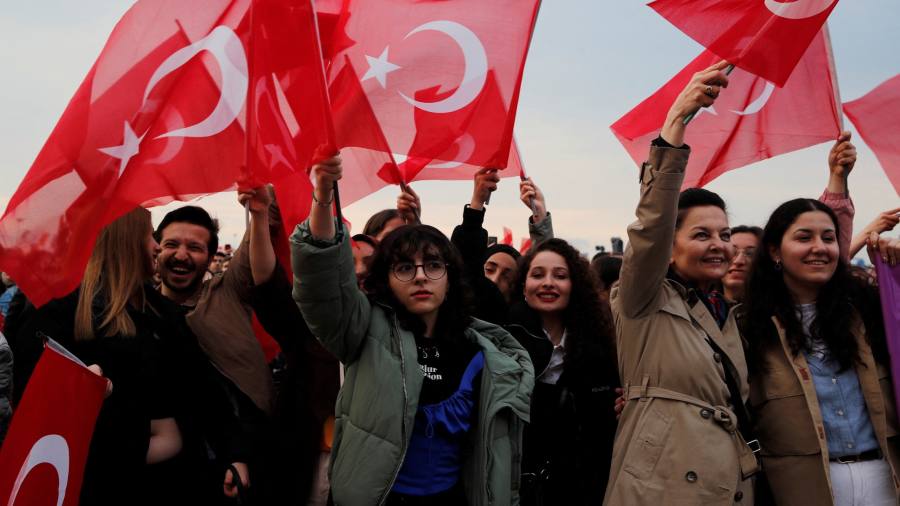Bursting with confidence, Turkey’s opposition alliance cleared a 600-seat hall for journalists on Sunday, while preparing an outdoor square for a rally to follow an election victory.
One senior adviser to the presidential candidate Kemal Kılıçdaroğlu predicted he would “win in the first round” against Turkey’s strongman Recep Tayyip Erdoğan.
In the event, the mood was so dismal once the votes were counted on Monday that Kılıçdaroğlu felt obliged to release a video to prove he still existed. Slamming the table with his fists, he boomed: “I-AM-HERE”.
It marked the start of a jarring makeover for Turkey’s lead opposition candidate, whose campaign has swung from talk of spring, pictures of cherry trees and heart-shaped emojis to bellicose speeches promising to throw out millions of immigrants.
“Kılıçdaroğlu ran this campaign promising heavenly gates would open. Now he’s saying that the gates of hell need to be shut,” said Kemal Can, a journalist and author who has covered the right in Turkey for more than three decades.
“When politicians in Turkey fall short or need quick results, they play the nationalism card.”
Kılıçdaroğlu’s last-ditch gambit aims to turn around the campaign before the May 28 second round vote. His challenge is to make up a seemingly insurmountable gap with Erdoğan, who emerged with 49.5 per cent versus Kılıçdaroğlu’s 44.9 per cent on Sunday.
In play are the first round votes for Sinan Oğan, an Azeri heritage, Moscow-educated, Turkish-nationalist candidate who captured an unexpectedly big 5 per cent share with a platform playing to the traditional grievances of the right.
On cue, at a press conference on Thursday deployed Erdoğan’s fiery campaign style, vowing to “send all refugees home” as soon as he came to power. The country has more than 3mn Syrian refugees living within its borders, and others who have migrated from countries including Afghanistan. Immigration is a key issue across political parties.
Any effort to run a positive, issues-based campaign has also been abandoned for bare-knuckled attacks on the president. “Erdoğan, you did not protect the borders,” Kılıçdaroğlu declared.
Pushing back at repeated claims by Erdoğan that the opposition is aligned with terrorists, Kılıçdaroğlu accused Erdoğan of the same, citing the president’s efforts until 2015 to resolve a decades-long insurgency by Kurdish militants.
He has even made hay from Erdoğan’s erstwhile ties to the cleric Fethullah Gulen, who the government now blames for orchestrating a failed 2016 coup attempt from his compound in Pennsylvania.
One former MP in Kılıçdaroğlu’s Republican People’s party (CHP) said his swerve to the right “signals desperation” and would ultimately backfire.
“He needs to present a portrait of a calm, capable, steadfast leader,” the ex lawmaker said, speaking on condition of anonymity. “A lot of people will still vote for him tactically, including Kurds and others who feel victimised by this new rhetoric.”
It was not just Kılıçdaroğlu who disappointed. Other members of the “table of six” opposition coalition also underperformed in the parliamentary vote. The nationalist İyi party, the second biggest member of the alliance, took home only 9.7 per cent of the vote, according to state media, much lower than the low double digits some polls had predicted.
The Nationalist Movement party (MHP), which forms part of Erdogan’s parliamentary coalition, in contrast did better than was forecast in the polls.
Emre Peker, an analyst at the Eurasia Group consultancy, said that Kılıçdaroğlu had, through his shift to a more “hawkish and aggressive tone”, moved into comfortable territory for Turkey’s ruler, a no-holds-barred campaigner who has effectively co-opted the MHP, Turkey’s most established far-right party. “Whenever Erdoğan is playing a home-game, the opposition is at a significant disadvantage.”
Alp Coker, an analyst at consultancy JS Held, said Kılıçdaroğlu has long used tough language on refugees. “What has changed is the tone and the prominence of the message,” he said.
Coker argued the stance would probably appeal to large swaths of the CHP base, even if it could unsettle some more liberal supporters in big cities like Istanbul and Ankara. It also risks repulsing leftwing Kurdish voters who overwhelmingly backed Kilicdaroglu after the Kurdish opposition endorsed his candidacy.
Still, the energy that had galvanised a broad coalition of voters to back Kılıçdaroğlu seems to have largely faded, as the leaders of the five other parties in the alliance avoid the press and public because “no one wants to take the blame for this defeat,” said Seren Selvin Korkmaz, director of the Istanbul Political Research Institute.
“Had Kılıçdaroğlu come out [on election] night and given his own victory speech, he could have managed the narrative, but instead it became one of complete failure,” she said. “Now the opposition’s strategy has to include consolidating a base that is demoralised.”
Read the full article here




